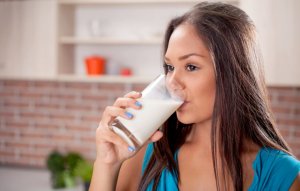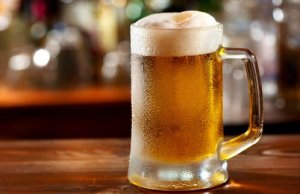Does Beer Hydrate The Body?

It’s a phrase that’s often heard by staunch defenders of the benefits of this drink. But is it true that beer hydrates the body? We analyze its virtues and characteristics to evaluate this theory.
Does beer provide many minerals?
It’s possible to think that beer has a high hydration capacity for two different reasons: its high content of minerals and the very fact that it is a liquid. What is the truth here? Is it true that beer provides as many micronutrients as advertised?
To answer these questions we are going to do a very simple exercise: compare the micronutrients provided by a glass of beer with those provided by a glass of milk.

Amount of minerals in milk compared to beer
We start with calcium. A glass of beer provides 14 mg of calcium compared with 186 mg contained in a glass of milk. Milk contains 13 times more calcium than beer.
Another component that we can compare is potassium. This micronutrient is reputed to be present in beer and does not stand out for its presence in milk. Try typing, “beer + potassium” into a search engine, and you’ll see hundreds of results praising beer for its high potassium content.

Well, although not as well known, a glass of milk contains 3.5 times more potassium than a glass of beer. There is only 64.75 mg of potassium present in a glass of beer, compared to 235.5 mg in a glass of milk.
And finally, phosphorus. One glass of milk contains 25.5 mg of phosphorus, how many milligrams do you think beer has? As a tip, if you really want to include phosphorus in your diet, the most recommended foods are sardines (270 mg per 3.52 ounces) and seafood (200 mg per 3.52 ounces).
An egg (210 mg per 3.52 ounces) also stands out for its phosphorus content in particular. It has a high content of this mineral in the yolk (590 mg per 3.52 ounces).
We have just seen that, because of its mineral content, beer cannot be considered to be anything spectacular. Simply to drink a glass of milk we would surpass it. Now, it’s time to address the other defensive argument of beer, the subject of hydration.
Effects of alcohol on human bodily fluids
We all know that beer, like any alcohol, increases the urge to urinate. This has a very simple explanation since alcohol works with an important hormone in the process of excretion, the antidiuretic hormone (ADH).
The function of ADH is to help the kidneys reabsorb the water that is used to dissolve the toxic substances and wastes that we need to eliminate, and that are present in our blood. For this process, the body uses a lot of water but it’s not willing to lose it. To avoid this, ADH comes into play, which ensures that this water passes back to the body.

But, what does all this have to do with alcohol? It’s quite simple, alcohol inhibits the secretion of the antidiuretic hormone, and therefore, alcohol has a diuretic effect. Although it seems like a mental tongue twister, if we stop to think it through with logic, it’s very simple.
Ultimately, alcohol causes us to lose more water and the minerals contained in it more quickly. This is the main reason why we notice that after drinking alcohol, we have a stronger desire to go to the bathroom.
We already know that dehydration and loss of minerals aren’t good for muscle recovery. Therefore, after training is not the best time to have a beer.
It’s a phrase that’s often heard by staunch defenders of the benefits of this drink. But is it true that beer hydrates the body? We analyze its virtues and characteristics to evaluate this theory.
Does beer provide many minerals?
It’s possible to think that beer has a high hydration capacity for two different reasons: its high content of minerals and the very fact that it is a liquid. What is the truth here? Is it true that beer provides as many micronutrients as advertised?
To answer these questions we are going to do a very simple exercise: compare the micronutrients provided by a glass of beer with those provided by a glass of milk.

Amount of minerals in milk compared to beer
We start with calcium. A glass of beer provides 14 mg of calcium compared with 186 mg contained in a glass of milk. Milk contains 13 times more calcium than beer.
Another component that we can compare is potassium. This micronutrient is reputed to be present in beer and does not stand out for its presence in milk. Try typing, “beer + potassium” into a search engine, and you’ll see hundreds of results praising beer for its high potassium content.

Well, although not as well known, a glass of milk contains 3.5 times more potassium than a glass of beer. There is only 64.75 mg of potassium present in a glass of beer, compared to 235.5 mg in a glass of milk.
And finally, phosphorus. One glass of milk contains 25.5 mg of phosphorus, how many milligrams do you think beer has? As a tip, if you really want to include phosphorus in your diet, the most recommended foods are sardines (270 mg per 3.52 ounces) and seafood (200 mg per 3.52 ounces).
An egg (210 mg per 3.52 ounces) also stands out for its phosphorus content in particular. It has a high content of this mineral in the yolk (590 mg per 3.52 ounces).
We have just seen that, because of its mineral content, beer cannot be considered to be anything spectacular. Simply to drink a glass of milk we would surpass it. Now, it’s time to address the other defensive argument of beer, the subject of hydration.
Effects of alcohol on human bodily fluids
We all know that beer, like any alcohol, increases the urge to urinate. This has a very simple explanation since alcohol works with an important hormone in the process of excretion, the antidiuretic hormone (ADH).
The function of ADH is to help the kidneys reabsorb the water that is used to dissolve the toxic substances and wastes that we need to eliminate, and that are present in our blood. For this process, the body uses a lot of water but it’s not willing to lose it. To avoid this, ADH comes into play, which ensures that this water passes back to the body.

But, what does all this have to do with alcohol? It’s quite simple, alcohol inhibits the secretion of the antidiuretic hormone, and therefore, alcohol has a diuretic effect. Although it seems like a mental tongue twister, if we stop to think it through with logic, it’s very simple.
Ultimately, alcohol causes us to lose more water and the minerals contained in it more quickly. This is the main reason why we notice that after drinking alcohol, we have a stronger desire to go to the bathroom.
We already know that dehydration and loss of minerals aren’t good for muscle recovery. Therefore, after training is not the best time to have a beer.
This text is provided for informational purposes only and does not replace consultation with a professional. If in doubt, consult your specialist.








